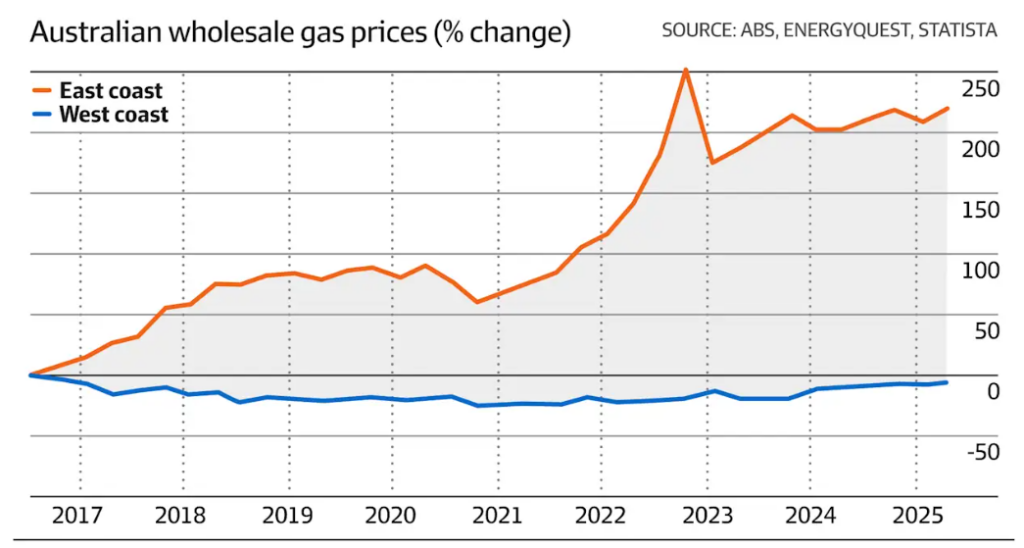The wreckers of Australian energy, and therefore living standards, as well as climate change mitigation, are shrieking like stuck pigs.
At the top of the list is the corrupt Grattan Institute, sponsored by Origin.
Its analyst, former Origin executive Tony Wood, famously campaigned against gas reservation in 2013.
“With more than $160 billion forecast to be invested in LNG production, the export industry is good for the economy. Governments should therefore resist self-interested calls from some industries to reserve gas or cap prices for the domestic market”.
“One reason that reserving gas is a bad idea is that there is no shortage of gas. The challenge is to ensure that the gas gets delivered to where it is required, and this means commercial buyers and sellers need to reach commercial terms on new arrangements”.
“Capping prices for the domestic gas market is a very bad idea. It amounts to a tax on producers and a subsidy for domestic gas users. Protectionism of this sort may provide some short-term price relief for targeted industries, but it tends to mean inefficient businesses and less investment”.
“Ultimately it leads to higher prices and damages the economy for us all”.
We all know how that turned out. On the weekend, he returned shrieking that it was everybody else’s fault:
First…power price increases over the past five years have been more due to issues outside the power of governments than to Labor’s policies.
Those issues include ageing and increasingly unreliable coal-fired power plants, really bad weather, and high coal and gas prices, partly driven by the war in Ukraine.
…The Ley/Tehan hypothesis seems to be that removing policies to reduce emissions and support renewables will lead to an abundance of lower-cost electricity.
Second, after falling from just over 600mt of CO2e in 2005 to 445mt in 2021, Australia’s emissions have flat lined since. We have done the easy things, with rooftop solar and connecting solar and wind farms to the existing transmission grid.
We have stalled on building transmission for the next growth in renewables, due to high costs, regulatory barriers, and social licence failures.
The Liberals propose to remove all these policies and mechanisms. They have suggested some form of targeted technology support and a voluntary offset market to reduce emissions year-on-year to meet a series of rolling five-year targets, presumably calibrated against progress in emissions reduction being made by OECD countries.
I will tell you what has happened. Because energy wrecker Tony Wood succeeded in derailing gas reservation on the East Coast, Australia was made vulnerable to global gas prices. WA had reservation, and it is not.
The result speaks for itself.

Because the gas price sets the marginal cost of electricity in the wholesale market, the direct result has been skyrocketing electricity prices since 2014.
In turn, this has (rightly) pissed off households and businesses as they are gouged mercilessly by the East Coast Gas Cartel created by Wood.
This has stalled the energy transition directly by creating doubts around investment and indirectly by opening a political space to privilege lower bills over mitigation.
That is, outside of government, Tony Wood is the principal intellectual wrecker of Australian energy.
But what of government? Why did it listen? The Gillard Labor government did consider East Coast domestic reservation in 2012.
Indeed, it was recommended by the government’s own task force and went to a Cabinet vote.
Ten years later, as the failure of that vote delivered Australia an $80Gj gas price, 2000% higher than it was in 2012, Albo was pulling a Wood.
The Prime Minister also said Labor “did argue for the capacity of a domestic gas reservation for a period of a long period of time”.
…The Gillard government’s 2012 manufacturing task force called Smarter Manufacturing for a Smarter Australia, included business and union representatives and recommended that “the government take action to ensure Australian industry has access to natural gas for the domestic market at fair and competitive prices”.
…The task force cited the WA policy as a positive example, showed supporting evidence from industry and economists and also recommended a Nordic style sovereign wealth fund using revenue from gas production.
…Of the senior Labor leadership in 2012 when domestic gas preservation was rejected there are now 13 who were then in Cabinet or the outer ministry, including Albanese, Chris Bowen, Tony Burke, Penny Wong, Richard Marles and Bill Shorten, and the new Treasurer, Jim Chalmers, was the chief of staff to the then Treasurer and Deputy Prime Minister, Wayne Swan.
Resources Minister Martin Ferguson and future Resources Minister and Woodside alumnus Gary Gray led resistance to the proposal in Cabinet.
How did the others vote?
I have it on good authority that Industry Minister Kim Carr voted in favour. PM Julia Gillard was known to be in favour.
Of the others, Minister for Infrastructure and Transport Anthony Albanese, and now PM, voted “no”.
Then Minister for Immigration and Citizenship Chris Bowen, and now Energy Minister, also voted “no”.
These men are the wreckers of Australian energy, and they are in charge.

